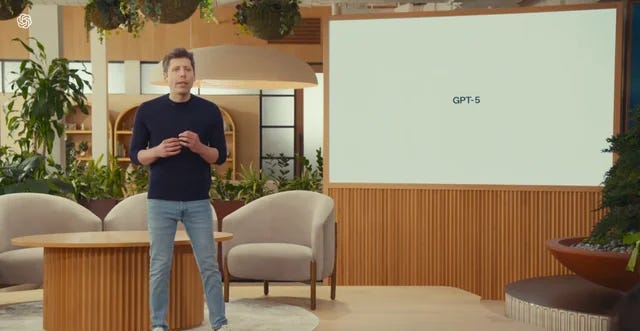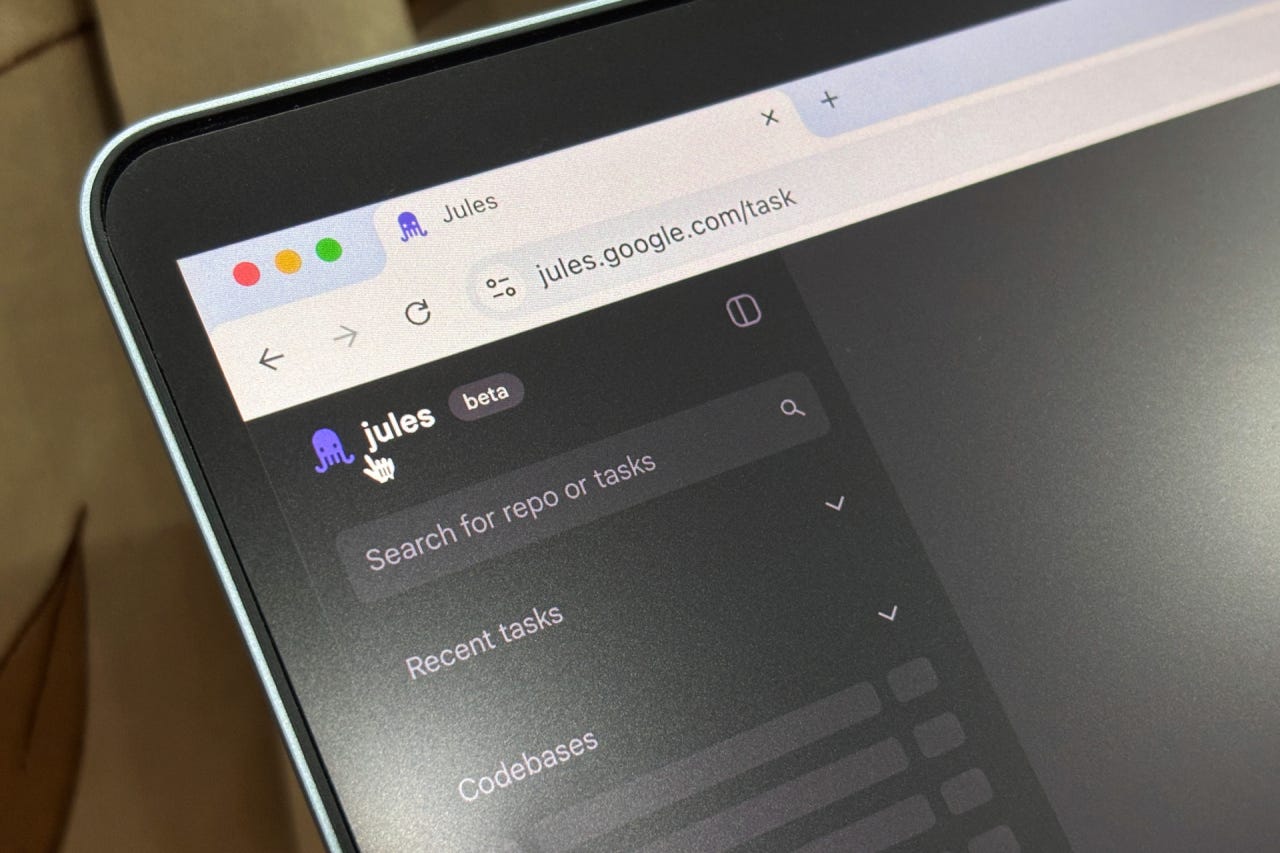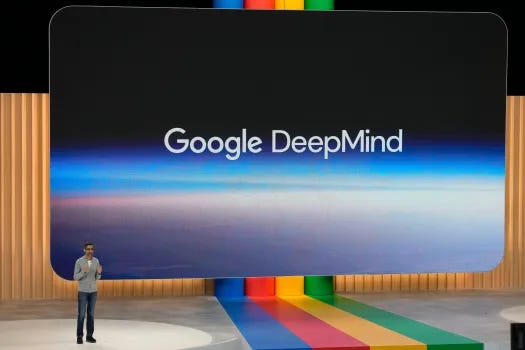AI Weekly Wrap-up #04 – By AI Space
Making sense of the AI revolution one week at a time - from OpenAI's latest models to Google's security tools and Microsoft's strategic moves
Hola 👋, AI Enthusiasts.
It’s been one of those weeks where the AI world feels like it’s running on caffeine and chaos.
OpenAI’s GPT-5 finally landed, and it’s already making waves. Over at Airbnb, the CEO wants you to know AI agents aren’t the “new Google” so let’s not get too carried away. Meanwhile, Google quietly pushed its AI coding agent Jules out of beta, while Microsoft decided to slip OpenAI’s smallest open model right into Windows.
On the security front, Google says its AI-powered bug hunter caught 20 vulnerabilities before they could cause trouble. And in the “practical wins” category, ChatGPT might just help you land your dream job faster if you know how to ask the right questions.
Oh, and of course, we’ve got a Prompt of the Day you don’t want to miss.
Let’s dive into this week’s AI madness.
In today's AI Weekly wrap-up:
OpenAI’s GPT-5 is here.
AI agents aren’t the ‘new Google,’ says Airbnb CEO.
Google’s AI coding agent Jules is now out of beta.
Microsoft brings OpenAI’s smallest open model to Windows users.
Google says its AI-based bug hunter found 20 security vulnerabilities.
ChatGPT can help you land your dream job fast.
Prompt of the Day.
1. OpenAI’s GPT-5 is here
OpenAI has launched GPT‑5, its most advanced AI model yet, aiming to evolve ChatGPT from a simple conversational tool into a true task‑completing assistant. It can write full apps, manage schedules, draft research, and handle complex reasoning with greater accuracy and speed.
Merging the deep thinking of its o‑series with the quick replies of the GPT‑series, GPT‑5 is now the default for all free ChatGPT users, while Pro subscribers get higher limits and stronger performance.
Key Highlights:
Unified model: Combines deep reasoning (o‑series) with fast responses (GPT‑series).
Wider access: Default for all free ChatGPT users; Pro plan offers higher limits.
Better performance: Tops coding benchmarks; improved accuracy in STEM, health, and creative work.
Fewer errors: Hallucination rate down to ~4.8%, big improvements in health advice.
Human‑level skill: Altman claims expertise like a PhD professional.
Adaptive output: Auto‑switches between quick answers and deep reasoning.
For developers: API offers gpt‑5, gpt‑5‑mini, and gpt‑5‑nano.
Safer AI: Stronger safeguards against unsafe or deceptive responses.
Mixed reaction: Praised for upgrades; some see it as evolution, not revolution.
2. AI agents aren’t the ‘new Google,’ says Airbnb CEO
Airbnb CEO Brian Chesky says AI agents aren’t the “new Google” and won’t replace its powerful referral system anytime soon. While they can generate leads for Airbnb’s travel business, the technology is still early and offers limited proprietary advantage.
The company’s new AI customer service bot in the U.S. has cut human contacts by 15% and will expand to more languages this year. By 2026, it aims to handle tasks like canceling bookings and planning trips.
Key Highlights:
Not the new Google: AI agents are experimental and not a replacement for Google's referral power.
AI customer service: Reduced human agent contacts by 15% using a multilingual, multimodel AI agent.
More personalization: Plans to enable the AI agent to take action, like canceling bookings or trip planning, by 2026.
Search integration: AI will enhance Airbnb’s search capabilities next year.
Competitive edge: Comes from tuning AI to specific use cases, not raw AI model ownership.
User accounts: Booking requires an Airbnb account, helping avoid commoditization.
Lead generation: AI seen as a tool to drive users to Airbnb rather than replace its core business.
3. Google’s AI coding agent Jules is now out of beta
Google has officially launched Jules, its AI-powered asynchronous coding agent, out of beta. Jules uses Gemini 2.5 Pro and integrates with GitHub, cloning codebases into secure Google Cloud virtual machines to autonomously perform coding tasks while developers focus on other work.
With the public release, Google introduced tiered pricing: a free introductory plan with 15 daily tasks and paid Google AI Pro and Ultra plans offering 5× and 20× higher usage limits, respectively.
Key Highlights:
Asynchronous operation: Runs tasks independently in the cloud, freeing developers to do other work.
Powered by Gemini 2.5 Pro: Advanced reasoning leads to higher-quality code changes.
GitHub integration: Clones repos, manages branches, opens pull requests automatically.
Parallel task handling: Supports multiple concurrent coding tasks for faster workflows.
New features: Reuse task setups, multimodal inputs/outputs, audio changelogs.
Pricing: Free tier (15 tasks/day); paid plans for heavy users with higher limits.
Privacy: No private repo data used for AI training; public repo data may be used.
User base: AI enthusiasts and professional developers with millions of visits during beta.
Distinct from other tools: Unlike synchronous coders, Jules works asynchronously in VM, allowing developers to "set and forget" tasks.
Google plans to expand Jules’ use internally and push it into more projects, aiming to transform software development by automating complex coding workflows while keeping developers in control.
4. Microsoft brings OpenAI’s smallest open model to Windows users
Microsoft has made OpenAI's new free and open GPT model, gpt-oss-20b, available to Windows 11 users via its Windows AI Foundry platform. This lightweight, tool-savvy model is optimized for agentic tasks such as code execution and tool use, running efficiently on a range of Windows hardware with at least 16GB of VRAM from Nvidia or Radeon GPUs.
The text-only gpt-oss-20b excels at powering autonomous assistants and integrating AI into real-world workflows, even in bandwidth-constrained environments. Microsoft plans to expand support to macOS and other devices soon, while also offering gpt-oss-20b and the larger gpt-oss-120b model through Azure AI Foundry and Amazon AWS.
Key Highlights:
Lightweight & efficient: Runs locally on consumer PCs with modern Nvidia/Radeon GPUs (16GB VRAM minimum).
Agentic tasks: Suited for coding, web search, and tool-calling with advanced chain-of-thought processing.
Text-only: Does not support image or audio generation like other OpenAI models.
High hallucination rate: Internal tests showed about 53% hallucination on knowledge-based benchmarks, indicating caution in sensitive use cases.
Open-weight models: Provides developers freedom to run and fine-tune models locally or in the cloud.
Expanding platform support: Windows 11 now, macOS and more devices coming soon.
Cloud availability: Both gpt-oss-20b and gpt-oss-120b available via Microsoft’s Azure AI Foundry and Amazon AWS.
This move enables broader developer access to powerful AI models locally with privacy and latency advantages while fostering innovation for autonomous AI assistants and workflow automation.
5. Google says its AI-based bug hunter found 20 security vulnerabilities
Google's AI-powered bug hunter, codenamed Big Sleep, has successfully found and reported its first 20 security vulnerabilities, mostly in widely used open-source software like the multimedia library FFmpeg and image-processing suite ImageMagick.
The tool was developed by DeepMind in collaboration with Google's elite security team Project Zero.
Each vulnerability was discovered and reproduced autonomously by the AI agent without human intervention, although a human expert reviews reports before they are officially submitted to ensure quality and actionability.
Key Highlights:
Big Sleep AI: LLM-based vulnerability researcher by DeepMind and Project Zero.
First 20 vulnerabilities: Found in popular open-source projects including FFmpeg and ImageMagick.
Autonomous discovery: AI independently finds and reproduces bugs; human expert in final review.
No public details yet: Severity and impact are withheld as fixes are pending.
Significance: Demonstrates AI's growing role in cybersecurity automation.
Human + AI: Combines AI efficiency with human expertise for reliable bug reporting.
Peers: Other AI bug hunters like RunSybil and XBOW are also active in this space.
Challenges: Some bug reports can be AI hallucinations, requiring expert validation.
This development underscores the increasing sophistication of AI tools in proactively identifying software vulnerabilities, potentially improving software security at scale while still relying on human oversight for sensitive decisions.
6. Prompt of the Day
ChatGPT can help you land your dream job twice as fast. Here are 8 powerful ChatGPT prompts will 10X your interview chances.
1. Customizing Your Resume ChatGPT prompt: "Can you make changes to my resume to fit the [Job Title] role at [Company]? Here's the job description: [Paste Job Description], and resume: [Paste Resume]."
2. Creating a Professional Summary ChatGPT prompt: "Using my resume, can you create a professional summary for me aligned to this [Job Title]." [Paste Resume]
3. Understanding Job Descriptions ChatGPT prompt: "What are the main responsibilities for this job? Please list the top three responsibilities required for [Job Title]." [Paste Job Description]
4. Improving Your Resume Bullets ChatGPT prompt: "Please rewrite this bullet point from my resume using clear and impactful language while highlighting my accomplishments. [Paste Resume]"
5. Writing a LinkedIn Summary ChatGPT prompt: "Can you write a summary for my LinkedIn profile using my resume [Paste Resume]?"
6. Job Applications with ChatGPT ChatGPT prompt: "Can you identify my [Skills] experience from my resume [Paste Resume]? Please describe my specific [Skills] experience in conversational, clear language as if you were me."
7. Crafting Your Cover Letter ChatGPT prompt: "Can you write a personalized cover letter for the [Job Title] position at [Company]? Here's the job description: [Paste Job Description], and my current resume: [Paste Resume]."
8. Preparing for Interviews ChatGPT prompt: "What skills and experiences should I emphasize during an interview for the [Job Title] role in [Specific Industry]?"







